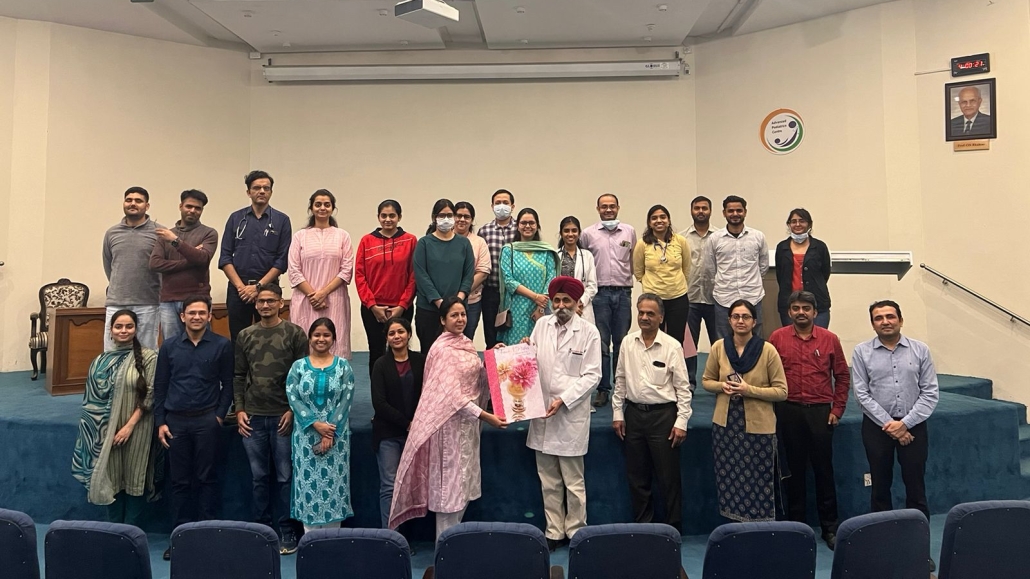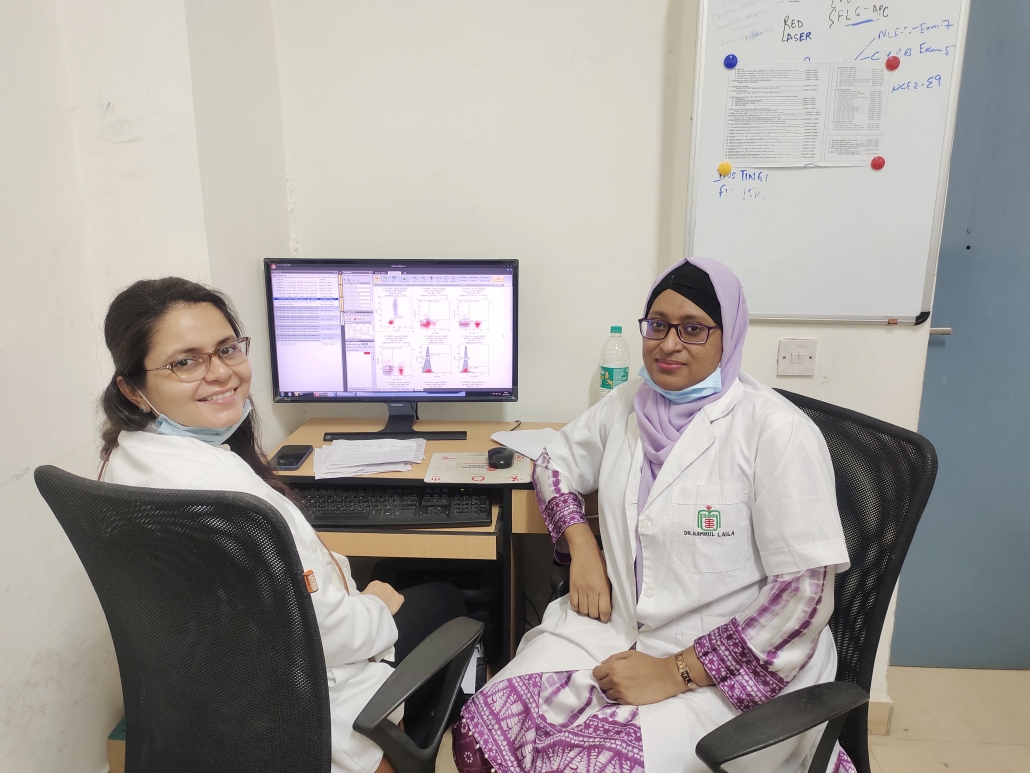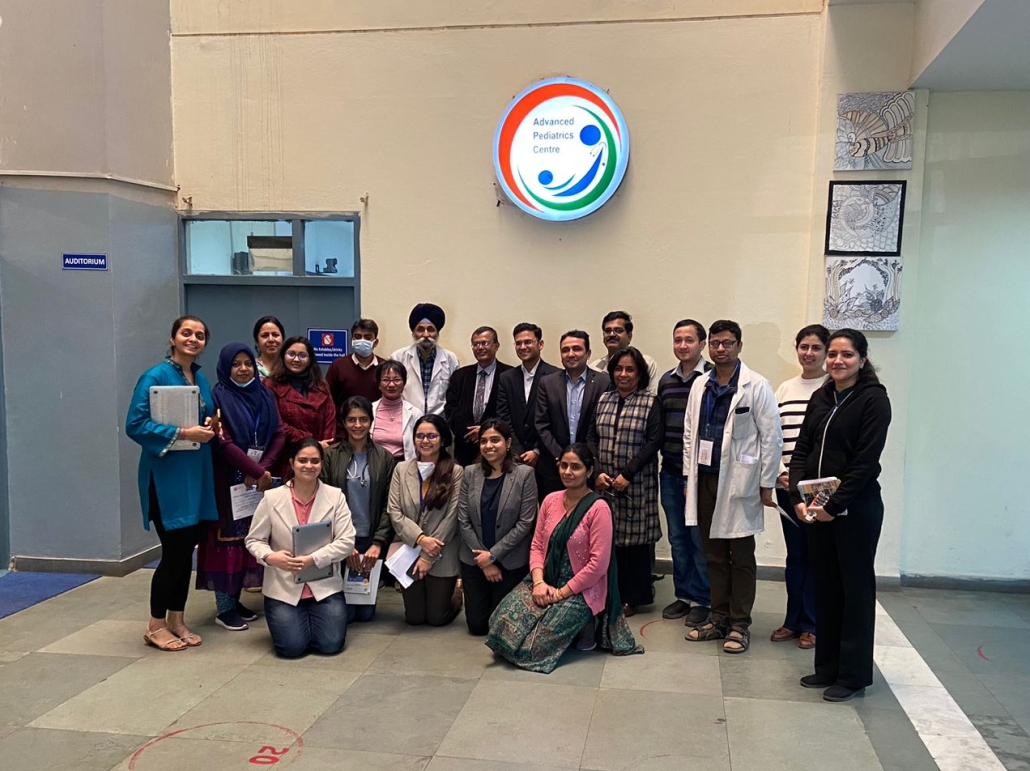PIDetect: Enhancing PID Diagnosis in Low- and Middle-Income Countries

Primary immunodeficiencies (PIDs) are believed to affect around 6 million people worldwide, but 70 to 90% of patients do not have access to proper care. The key factor behind these numbers is a low diagnosis rate, particularly in low- and middle-income countries (LMIC).
To address this problem, IPOPI has launched the PIDetect programme, which provides intensive training to selected doctors from LMIC to improve their skills in recognising and diagnosing PIDs. The programme is hosted in a PID reference centre and is aimed both at clinicians and laboratory scientists with an interest in PIDs. It comprises intensive clinical and/or laboratory training tailored to the individual needs and background of each attendee, followed by a local implementation activity whereby the acquired expertise is shared more widely with doctors in the target country.

Dr. Laila Kamrul and Dr. Ismet Nigar, healthcare professionals from Dhaka, Bangladesh, took part in the IPOPI PIDetect program in 2022 and 2023. During their participation, they received four weeks of clinical and laboratory diagnostic training provided by Prof. Surjit Singh at the Chandigarh Post Graduate Institute of Medical Education and Research, (PGIMER) India.
PID Diagnostics and Care in Bangladesh
We need skilled resources to build a vibrant health sector on to detect and treat PID cases in the coming years – Dr. Laila Kamrul
The Bangabandhu Sheikh Mujib Medical University (BSMMU) in Dhaka where both doctors are employed is the only tertiary care centre in Bangladesh, a country counting 170 million inhabitants, regularly receiving suspected PID cases. The current methods used for PID diagnosis are based on family history, use of the ten PID warning signs, few immunological laboratory tests and most recently limited DNA sequencing. Using this approach, 70 patients have successfully been diagnosed with PID since 2012. The doctors describe the environment for PID patient care in Bangladesh as challenging due to the limited laboratory facilities and the high cost of specific management, such as for the use of intravenous immunoglobulin therapy. At present, hematopoietic stem cell transplantation is not available as a treatment option for PIDs in Bangladesh.
Training content and learning environment
Prof. Surjit Singh is very much supportive of the foreign trainee – Dr. Ismet Nigar
The skills that have been learnt are actually helpful – Dr. Laila Kamrul
As a paediatrician, Dr. Kamrul had the opportunity to observe and manage a variety of PID cases, both in inpatient and outpatient settings. During her training, she learned about new diagnostic techniques and investigations that are not currently available in her home country. She was exposed to a wide range of PIDs which she had never encountered before. These included leukocyte adhesion deficiency (LAD), severe congenital neutropenia (SCN), cyclic neutropenia, autoimmune lymphoproliferative syndrome (ALPS) and familial hemophagocytic lymphohistiocytosis (fHLH), amongst many others.
Dr. Nigar on the other hand is a laboratory scientist who specializes in microbiology and immunology. During her training, she broadened her expertise in laboratory procedures for PID diagnosis, including immunological tests using flow cytometry, DNA sequencing, chromosomal microarray and analysis of the retrieved data. She also had the opportunity to attend the Global Initiative of Academic Networks (GIAN) conference and gain knowledge on various aspects of immunological testing.
Tailored training sessions were provided to the two doctors based on their different backgrounds, which were well-matched to complement each other, and catered to their specific needs and interests. The training was considered to be highly relevant, and the facilities were described as advanced, attractive learning environments. Most importantly, Dr. Kamrul and Dr. Nigar agreed that the learned skills are particularly useful and can effectively be implemented in their home institution.
Using and spreading newly learned skills
As a first step in genetic profiling of PID patients, we are very eager to introduce Sanger sequencing in our laboratory – Dr. Ismet Nigar
The ability to effectively apply the acquired skills and techniques in the participants’ home countries is a key factor in the success of the PIDetect programme. Fortunately, both doctors indicated that the subjects taught during their training nicely aligned with the current possibilities for improvement in their facility, thus lowering the threshold for actual implementation. More specifically, the learned laboratory techniques were either based on further expanding the use of existing equipment, or were considered inexpensive and easy to implement.
The aim of PIDetect is also to help spread the newly acquired knowledge on PID diagnostics more widely throughout the target country. Useful dissemination tools suggested by Dr. Kamrul and Dr. Nigar include delivering presentations to fellow colleagues, presenting cases at conferences, and including the topic in student classes and tutorials. Next to these initiatives, IPOPI will support the organisation of a national implementation activity to help share the expertise acquired during the training. The exact format of this activity is still to be defined in collaboration with BSMMU in Dhaka, but it will very likely be a hybrid activity to encourage a wide attendance.
Lastly, we would like to thank Prof. Surjit Singh and his team for welcoming Dr. Kamrul and Dr. Nigar to his institute and providing them with such an enriching training experience. IPOPI will work closely with the doctors to disseminate the expertise acquired during the training to benefit more healthcare professionals in Bangladesh who may diagnose and treat patients with PID.







